Youth movement’s rising tide
Has competitive bass fishing turned into a young man’s game or do crafty veterans still have the edge?
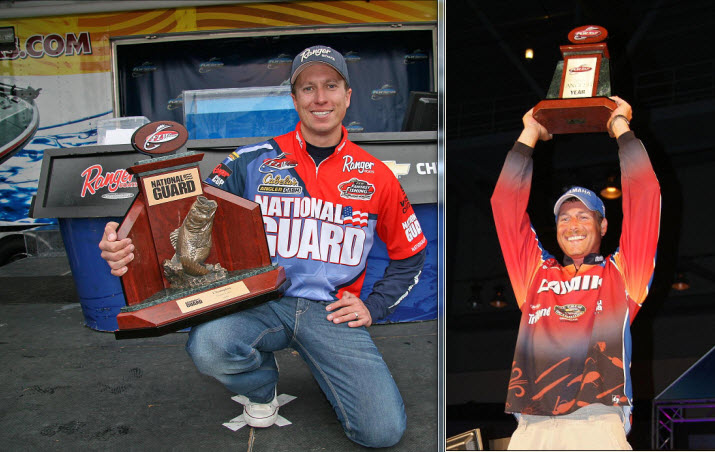
As a pastime, the sport of fishing doesn’t discriminate by age or gender. Fish are blind to race and indifferent to special needs, making it an ideal pursuit for all types of people in any type of situation. But when a pastime becomes a competition – when a hobby becomes a way of life – does it pay to be young?
At a glance, it would seem that way. Of the four men who have claimed FLW Tour victories so far in 2010, three were 34 years old or younger (recent Lake Guntersville winner Brent Long was the only angler to fall outside of that age group at 39). The current market seems to be skewed toward the young generation as well. The explosion of the Internet, specifically social networking, can leave a grizzled veteran feeling like a hitchhiker on the information superhighway.
Of all the young guns climbing up the FLW Tour ranks, two in particular – Brent Ehrler, 33, and Bryan Thrift, 30 – seem to be anglers of a particularly hardy breed.
Thrift’s season includes the prestigious 2010 FLW Tour Angler of the Year title, three finishes in the top four, one finish in the top 10 and one Tour victory (Lake Norman), while Ehrler hoisted two winner’s trophies this year (Table Rock Lake and Lake Ouachita) and finished in fifth place overall in the AOY competition. Either man’s stats could make a competitor cower in fear, as Ehrler finished last season ranked third and the year before that, second. Thrift earned back-to-back fifth-place rankings in 2008 and 2009.
The current young-gun movement isn’t limited to Thrift and Ehrler, of course. In the coming years, bass-fishing fans almost certainly will become familiar with names like Cody Meyer, 27, Stetson Blaylock, 22, Andy Montgomery, 27, and Justin Lucas, 24 – each already proving in multiple tournaments that they will be a force to be reckoned with in due time.
But what about the veterans? Men like Guido Hibdon, Larry Nixon, George Cochran and many more built the sport into what it is today. Their TV appearances, magazine articles and seminars helped teach today’s generation of bass anglers what it took to be a pro. Now these men find themselves competing against the anglers they helped raise, so to speak.
“It’s their fault for training us!” said Ehrler with a laugh. “They were so good at teaching us new and better techniques. They are the ones who paved the way for us.”
Guido Hibdon’s son, Dion, has more than two decades’ worth of experience in the competitive bass-fishing realm and thus finds himself in the veteran category at the relatively young age of 43. He’s all too familiar with the rise of the young gun because at one point in time, he fit that bill.
“When I started fishing, the average age was in the 40s,” Hibdon said. “They made a big deal of it because I was 17. It was just me and two or three other guys who were that young, and everybody stood back and stared. I couldn’t even grow facial hair yet. I don’t know where it slipped by me, but now I’m one of the old-timers.”
Stamina: advantage, youth
Statistics don’t lie, and even the most cursory glance at recent FLW Tour trends clearly shows the rise of the young angler, though many of the 50-plus crowd, including fourth-ranked Ron Shuffield, continue to make their presence known on a regular basis.
There seemed to be a consensus that if a younger angler does indeed have an advantage, it is mainly because of stamina. The veterans still have their strengths, but physically, it’s a young man’s game.
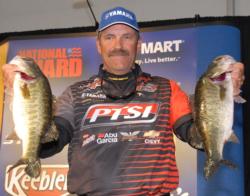 “The speed at which they cover water amazes me,” says Shuffield, a veteran angler who finished second behind Ehrler on Table Rock Lake in March. “They tend to run and gun, and I’ve got a slower pace. It’s a stamina factor. I still fish daylight to dark and practice as hard as I ever did, but probably not as quickly.”
“The speed at which they cover water amazes me,” says Shuffield, a veteran angler who finished second behind Ehrler on Table Rock Lake in March. “They tend to run and gun, and I’ve got a slower pace. It’s a stamina factor. I still fish daylight to dark and practice as hard as I ever did, but probably not as quickly.”
Larry Nixon, one of the most lauded bass anglers of all time, rightly points out that the physical toll of banging around lakes in a bass boat for a few decades contributes to a veteran angler’s disadvantage in this area.
“Their hands are strong, their shoulders are good, and their back hasn’t been beaten out of place yet,” he said of the younger pros. “There are a lot of health issues from riding in a bass boat for 34 years.”
To ask the younger generation, though, if they have any advantage at all, it’s techniques. That said, the run-and-gun style favored by many younger anglers is eschewed by some in the older generation because of its physical toll, so it still boils down to stamina.
“The way fishing seems to be now, it seems to be more of a run-and-gun-style deal,” Thrift said. “You can jump around and hit a lot of places and make five or 10 casts, and then make five or 10 casts somewhere else, and you can do that all day. I think that kind of suits the younger guys.”
Hibdon well remembers the day when he could fish all day without paying the physical price.
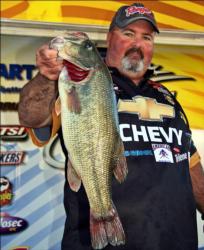 “These guys, they’re gung-ho, they’re spry,” he said. “My dad used to make fun of me when I was that age – `Oh, there’s nothing you wouldn’t do to catch a bass.’ There was no wave too tall. Now that I’ve been doing this for 23 years and I see other guys doing that, it kind of ticks me off because I’m not that way anymore. My deal ain’t daylight to dark anymore; it’s daylight to about 6:30. We can laugh about it, but these guys, they work out, they’re in shape. It’s not a hillbilly redneck sport anymore. These guys are toned up, and they can fish for a month straight without missing a day and never get run down. My poor old body gets run down.”
“These guys, they’re gung-ho, they’re spry,” he said. “My dad used to make fun of me when I was that age – `Oh, there’s nothing you wouldn’t do to catch a bass.’ There was no wave too tall. Now that I’ve been doing this for 23 years and I see other guys doing that, it kind of ticks me off because I’m not that way anymore. My deal ain’t daylight to dark anymore; it’s daylight to about 6:30. We can laugh about it, but these guys, they work out, they’re in shape. It’s not a hillbilly redneck sport anymore. These guys are toned up, and they can fish for a month straight without missing a day and never get run down. My poor old body gets run down.”
Ironically, it could be the run-and-gun style that keeps the young guys in shape.
“I have a harder time with exercise during the season,” Ehrler said. “I’m off at 4 a.m. and then back to the hotel at 8:30 that night. Every once in a while I will exercise, but I’m not consistent with it.”
Mind control: advantage, veteran
Bass fishing, though, is not just a physical sport, and if young guys hold the upper hand with physical stamina, the mental game may firmly belong with the veterans. That may be one of the biggest reasons why anglers of another generation continue to be a threat at tournament time.
“In a sense, it seems like a lot of the younger fishermen are doing well out there, but to be honest, there are so many guys that on any given day can win a tournament,” Ehrler said. “You can’t count (the veterans) out in any single tournament.”
Hibdon for one knows he’s still a contender and intends to fish like it every day he is on the water.
“I’ll take any of them on,” he said. “I’ll stand on the front of the bass boat with anybody. Nobody scares me. Nobody intimidates me. I can last all day with any fisherman on the planet.”
It’s that mental ruggedness, honed over years spent on the competitive field, that gives the veterans an edge when it comes to mind games.
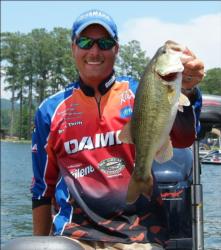 “The biggest thing mentally is having the confidence,” Thrift said. “You’ve got to get in that mindset – `I’ve got to catch five, and I’ve got eight hours.'”
“The biggest thing mentally is having the confidence,” Thrift said. “You’ve got to get in that mindset – `I’ve got to catch five, and I’ve got eight hours.'”
Veterans have seen it all, heard it all, experienced it all, and therefore no longer have the ability to be fazed by it all.
“I’ve got a lot of experience, and experience means a lot,” Hibdon said. “I’ve got a lot of patience. I don’t panic on the water, ever. I’m past the panic stage in my career. A lot of these guys push so hard to make it happen that they get scared in the middle of the day. That’s why we can still hang in there with them – we’re pretty patient. I see these guys who haven’t caught a lot of fish in practice, and it gets in their head.”
Ehrler, in only his sixth year as an FLW Tour pro, admits he still struggles with the mind game.
“Mentally, it’s very draining,” he said. “It’s very tough and very stressful because I’m worried about how it’s going to play out. The older and wiser ones, they don’t stress out as much. They’ve been around enough to relax and take things as they come.”
Shuffield knows, though, that no matter the age of the competitor, the mind is not something to take for granted.
“You have to remain very open-minded mentally to be competitive,” he said. “I have to mentally make myself stay with my strong points. Even though I’m willing to try to change, I still have to keep in the back of my mind, when all else fails, go to your strengths.”
Versatility: advantage, youth
But in today’s hyper-competitive, youth-favoring market, sometimes fishing to your strengths is not enough. Shuffield articulated the need to keep an open mind, and that could be one of the reasons why he continues to be a force to be reckoned with on the Tour. Many veterans, buffeted by years of success, can be hesitant to change tactics.
“For me it’s easier to pick up on the new trends,” Thrift said of being a young gun. “I don’t feel like I have any old favorites. It’s a lot easier to be a multidimensional fisherman instead of getting pegged as just doing one thing all the time.”
Nixon agrees that the younger anglers have spearheaded the concept that to compete, an angler must have an array of tools in his arsenal.
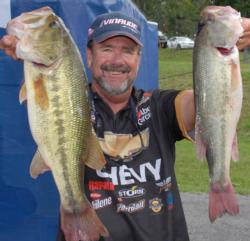 “To really compete, you’ve got to be dedicated, and that means spending lots of hours on the water and really getting comfortable fishing any lure that’s out there,” he said. “That’s the biggest advantage younger people have – they’ve got the get-up-and-go and the time to spend the hours that you have to spend. Just because you can catch fish doesn’t mean anything. You’ve got to catch them anywhere and everywhere.”
“To really compete, you’ve got to be dedicated, and that means spending lots of hours on the water and really getting comfortable fishing any lure that’s out there,” he said. “That’s the biggest advantage younger people have – they’ve got the get-up-and-go and the time to spend the hours that you have to spend. Just because you can catch fish doesn’t mean anything. You’ve got to catch them anywhere and everywhere.”
In fact, nearly every angler interviewed mentioned the necessity of diversity. Ehrler – arguably bass fishing’s hottest commodity right now – marked it as the biggest difference between the typical young gun and the typical veteran, and he made the observation with the greatest of respect for his forerunners.
“I guess we’re more diverse in our fishing techniques,” he said. “We’re not specialists. We can do a lot of different things, whereas a lot of the guys who were the forerunners of the sport were very good at doing one or two things. They were specialists. I think being young, we have different avenues to learn how to do different techniques.”
Tech savvy: advantage, youth
That ability to learn is a marked difference between the two generations. According to Hibdon, the amount of knowledge accessible to anglers today and the quality of the information has generated a much smarter generation of bass anglers.
“I wish I could use a computer better just so I could utilize this information,” Hibdon said. “These young guys carry a laptop with them, and they get that general information that takes me a couple of hours to figure out once I get to the lake. They have a better array of knowledge than they used to have. People are writing good stories, stories that really tell the facts about fishing. They get it out of magazines, out of videos, and out of watching shows like `FLW Outdoors.’ They’re like babies; they soak everything in. I look right through that stuff, just because of my age and because I’ve been doing this a long time. A lot of these young guys are really good because they’ve grown up with good information.”
Indeed, riding the wave of technology is something the veterans dabble in but the younger generation embraces.
“I have a Facebook page, and I have a web site,” Ehrler said. “I think there are a lot of avenues to get our names out there. The internet is a huge deal for the younger generation. The kids who are coming into it know so much more, and that is how they are finding out about it. They learn about us and get in touch with us. I email a lot with a lot of kids who are just getting into it.”
The value of respect
Someday, those very kids who once contacted Brent Ehrler via his Facebook page are going to show up at a launch ramp and the tables will be turned – today’s young guns will quickly become tomorrow’s veterans. In many respects, the current generation is setting a fine example of what it means to be respectful of the bass-fishing pioneers who paved the way.
“It feels great anytime you can get out there and tie a boat next to Larry Nixon and Guido and Ron Shuffield and all those guys,” Thrift said. “It kind of makes you smile and sit back and say, `Man, this is pretty cool.'”
Hibdon for one sees that respect. He not only appreciates them for it, but also continuously works to earn it.
“I want to beat these young guys,” he said. “I want them to look at me and say, `That guy’s still pretty good.’ My dad’s still the best bass angler, thinking-wise, on the planet; he just doesn’t have the body to go with it anymore. But every now and then, he still warps their butt, and that’s what keeps him going. He wants their respect, and he doesn’t expect them to give it to him for what he did 20 years ago, and that’s the way it is with me.
“These young guys, I respect a lot of them because of their angling abilities, but I intend to make them pay me some too.”
Ehrler for one has no problem with that.
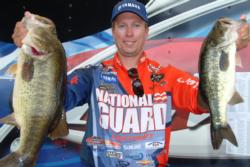 “There are so many of them that I would love to spend a day on the water with,” he said. “I have a lot of respect for them, and I have a lot more to learn from them, I really do.”
“There are so many of them that I would love to spend a day on the water with,” he said. “I have a lot of respect for them, and I have a lot more to learn from them, I really do.”
Knowing they have not only taught the up-and-comers but also still have more to teach gives the veteran pro a distinct source of pride.
“Just knowing that I’ve had a great career in something I love to do and was able to pass it on to the younger guys – that’s a tremendous feeling to me,” Nixon said. “It’s a great feeling of accomplishment.”
So while the statistics and the facts do seem to point to a young-gun advantage, the veteran pros aren’t ready to ride off into the sunset. Instead, they’d rather ride off into the sunrise at tournament takeoff, still competing.
“I consider myself a survivor,” Shuffield said. “I’ve seen many faces come and go, and I’m glad I’m still a part of it.”
Hibdon concurs.
“I’m glad I can still compete with them,” he said. “It means a lot to me.”